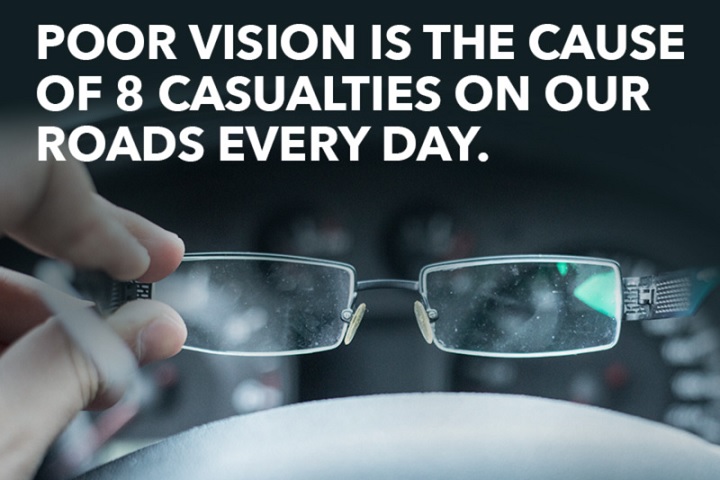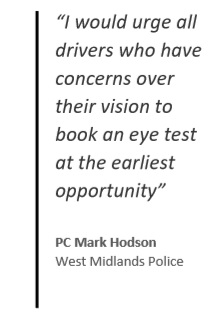
Around one in 20 drivers pulled over by West Midlands Police as part of a road safety initiative are failing basic eyesight tests, latest figures show.
Between 1 March and 20 August the force checked the vision of 81 motorists pulled over as part of Operation Close Pass – the force’s campaign to protect cyclists from dangerous overtakes.
All 81 were required to read a number plate from 20 metres – with four failing. Those who failed had their licence revoked on the spot after being ‘deemed a potential risk to other road users’.
 West Midlands Police is one of three constabularies – alongside Hampshire and Thames Valley – supporting a national driver vision campaign being run by road safety charity Brake throughout September.
West Midlands Police is one of three constabularies – alongside Hampshire and Thames Valley – supporting a national driver vision campaign being run by road safety charity Brake throughout September.
Under the campaign, officers will test every motorist they stop in a bid to clamp down on drivers with defective eyesight.
Superintendent Dave Twyford, head of the Central Motorway Police Group, West Midlands Police, said: “It’s worrying that around 5% of drivers we’ve pulled over recently during Close Pass have failed the basic eyesight requirements.
“Not being able to see a hazard or react to a situation quickly enough can have catastrophic consequences and potentially cost lives.”
PC Mark Hodson, West Midlands Police, said: “We have been routinely testing the eyesight of drivers for more than two years as part of Op Close Pass; drivers sometimes tell us ‘I didn’t see the cyclist’ so we give them a roadside vision check.
“As part of the Brake campaign our officers will be carrying out vision checks on all drivers who are pulled over on suspicion of committing a traffic offence or been involved in a collision.
“And I would urge all drivers who have concerns over their vision to book an eye test at the earliest opportunity… it could save a life.”
Anyone who has their licence revoked can apply and pay for a new one after sitting out a disqualification period. Evidence must be provided to the DVLA on reapplication showing that the driver’s vision meets the required standard.
Apologies – my speed reading, David Hickenbotham. and one for Charles, England. This is actually the nub of the problem and why we need to change the narrative from roads safety to road danger removal.
Poor eyesight is a key causal factor in many crashes, so removing drivers with poor eyesight from the driving population will reduce the risk of future crashes. Of course rather like the belief that a large number of arrests is evidence of good policing (when actually the lack of arrests is a far better metric) The knowledge that the current level of poor eyesight is 5% of drivers, we might be looking to reduce this to 0.5%, and this, with robust investigation of crashes (all too easy for the police officer making the report to tick the box “failed to see” when clearing their pile of paperwork) should reduce the risk, and number of crashes caused by drivers who should not be driving.
Dave H (@BCCletts)
0
Mr Higgenbottom needs to catch up with UK road policing practice. As we move away from road safety (reactive) to road danger removal (proactive) methods to reduce the toll of deaths, injuries and other harm arising from road transport, bringing this into alignment with air, rail and marine – with their significantly better safety records – ‘Cassies law’* will become a model for other interventions. We are already seeing the local community speedwatch reports used to ‘score’ a vehicle (and usually the same driver) for a TOR and potential NIP.
Hopefully soon we may see the earned repute (was OCRS) that DVSA already uses to focus resources on the least compliant HGV operators, developing to aid insurers by collating the detail on vehicles regularly driven in ways that have only by luck not resulted in harm being caused. Indications are that for every 10-12 near misses we have a crash through similar behaviour, and the long standing aphorism “Look after the pennies..” holds very true for reducing road crashes.
* Cassies Law relates to the Police fury at their inability to revoke on the spot, the licence of an old driver who had crashed his car and was patently unfit to drive through poor sight. Action to revoke had to be heard through the courts, and 3 days later Cassie was killed by that driver refusing to accept the Police ‘advice’ to stop driving. We already have PG9’s to immediately stop drivers using unsafe vehicles, and similar action on Section 59 (Driver ASBO’s) plus impounding of vehicles with no MOT, VED, or insurance. It clearly follows that if the driver is no compliant with the conditions required for a driving licence, they should also be immediately stopped from
driving. Questioning this suggests a worrying view on the reasons we licence the use of cars, as we do guns, heavy plant etc, all with well documented potential to cause serious harm when used by those not competent to do so
Dave H (@BCCletts)
0
Under what legislation do the Police have the powers to revoke a driving licence? I always thought that only the courts or DVLA have such power.
Whilst I fully agree those with eye sight that fails to meet the requirement shouldn’t be driving. The Police are required to act within legislation.
David Hickenbotham, Leicester
0
I was expecting to read in this article about how poor vision was the “cause” of eight casualties on our roads each day. But there was nothing in there about it. So I wonder is this just more fake road safety headlines from Brake and the police, or was the evidence of it mistakenly left out?
Charles, England
+1